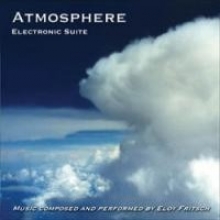MENNO VON BRUCKEN FOCK
ATMOSPHERE (NL+E)

De Braziliaanse toetsentovenaar en klassiek geschoolde toetsenist Eloy Fritsch heeft naast albums met de progressieve rockband Apocalypse ook een aantal soloalbums op zijn naam staan. Alle stukken op Atmosphere - dat je een elektronische suite zou kunnen noemen - zijn gecomponeerd en worden gespeeld door Fritsch die over een zeer indrukwekkend arsenaal aan keyboards beschikt. De synth-, piano-, vocoder-, sax- en percussie-effecten en de synthkoren vliegen je om de oren. Zijn inspiratiebron bij uitstek is Vangelis, naast de klassieke componisten. Fritsch opent met een opera-achtige ouverture, klassiek getint en met ‘koorzang’. In Troposphere worden de stukjes piano afgewisseld met meer bombast en begeleidt Fritsch zichzelf met diverse synths en ‘orkest’. Clouds bevat eenzelfde indeling en de meester laat hier horen dat hij pianoles heeft gehad, maar ook de orgel- en synthbegeleiding mogen er zijn! Het vriendelijke Stratus heeft een lieflijke melodie en in het al even mooie Cirrus liggen parallellen met Vangelis voor de hand. Op Stratosphere overheerst de invloed van Yellow Magic Ochestra door het gebruik van de vocoder, maar in het tweede deel met de vele orkestraties zijn ook vergelijkingen mogelijk met bijvoorbeeld Serge Blenner of Amin Bhatia. Vangelis en de koorzang keren terug in Aurora Borealis, terwijl de zeer toegenkelijke deun in Ionosphere meer neigt naar Jean Michel Jarre. Space, klassiek en melodieuze elektronische muziek zijn te horen Exosphere en evenals de opening is de afsluiting in klassieke stijl, waarna het album letterlijk wegkabbelt. Atmosphere is niet Fritsch' sterkste album, maar naar mijn smaak is het wel de zoveelste proeve van bekwaamheid die duidelijk maakt dat hij tot de top van het genre behoort.
ENGLISH:
Besides the albums he recorded with the prog rock band Apocalypse, Brazilian keyboard wizard Eloy Fritsch has produced five solo albums to date. All tracks on this Atmosphere, that you can call an electronic suite, were composed and performed by Fritsch, who apparently has a very impressive collection of keyboards at his disposal. Synthesizers, piano, vocoder, saxophone sounds, effects, percussion, choirs and tenors float or soar past. His main source of inspiration - apart from classical composers since Fritsch is a classically trained keyboard player - is Vangelis. The CD opens with an opera-like overture featuring classical choirs. The piano parts of Troposphere are interspersed by more bombastic episodes, accompanied by synths and orchestral sounds. Clouds is quite similar in lay-out. Here the master proves he has taken piano lessons indeed, but the organ and synth parts are pretty impressive as well! The sweet melody in the gentle track Stratus and the equally beautiful Cirrus clearly have parallels with Vangelis. Stratosphere is dominated by traces of The Yellow Magic Orchestra by using the vocoder!, but the orchestrations in the second part are equally reminiscent of Serge Blenner or Amin Bhatia. Vangelis and the choirs are brought back for Aurora Borealis, but the very accessible melody of Ionosphere sounds almost like Jean Michel Jarre. Space, classical music and melodious electronic music feature in Exosphere and like the album’s opener the closing piece literally fades away in a classical style. Although this is not his strongest effort in my opinion, it can still be considered another proof of his skills, which shows he is a master player in this genre.